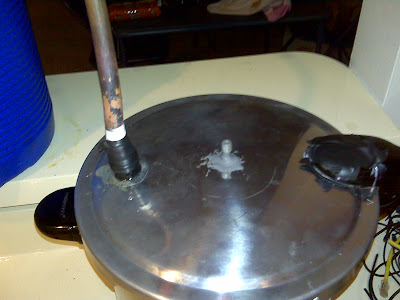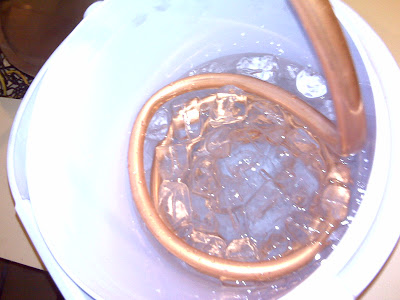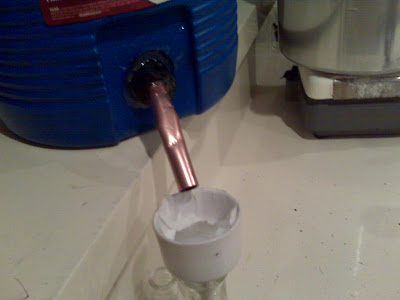| Pages:
1
2 |
watson.fawkes
International Hazard
    
Posts: 2793
Registered: 16-8-2008
Member Is Offline
Mood: No Mood
|
|
| Quote: | Originally posted by tom_servo
ok well one thing i have to say first, don't consider me unintelligent because I am amazed at the copper experiment |
My apologies. In the process of editing, I ended up saying essentially the opposite of what I meant. I've edited my post
accordingly.
|
|
|
DJF90
International Hazard
    
Posts: 2266
Registered: 15-12-2007
Location: At the bench
Member Is Offline
Mood: No Mood
|
|
If memory serves me well benzaldehyde is an important building block in organic synthesis. It is just unfortunate one such synthesis leads to an
illicit compound.
Chemistry is about learning AND understanding. To learn something is (fairly) easy, but to understand it is much more difficult. However once
understood you can apply it in a variety of contexts, and alot of the time come up with the right answer (i.e. the one that experimentation gives),
even if you actually have no idea about a specific reaction.
|
|
|
tom_servo
Hazard to Self
 
Posts: 52
Registered: 11-11-2008
Member Is Offline
Mood: No Mood
|
|
ok so here is the ghetto steam distillation device

The top has been jb cold-welded shut as well as the emergency release in the handle. The little side valve was removed and an L shaped connector put
inside then screwed onto a copper tube adapter.

Tube is then coiled around in a 2 gallon drink cooler

the spigot that the beverages usually come out of has been removed and a #5 rubber stopper fits perfectly so that was bored out until copper tube
tightly fit in it the pushed together and some epoxy sealed it the rest of the way.

Once this rxn is complete will post updates
|
|
|
tom_servo
Hazard to Self
 
Posts: 52
Registered: 11-11-2008
Member Is Offline
Mood: No Mood
|
|
| Quote: | Originally posted by not_important
For organic extraction you could use acetone |
This would be better to use on sassafras roots than water?
|
|
|
not_important
International Hazard
    
Posts: 3873
Registered: 21-7-2006
Member Is Offline
Mood: No Mood
|
|
Essential oils have low water solubility, solvent extraction means soaking the material in a solvent for the oils and then filtering out the
oil-depleted solids. A Soxhlet or similar extraction device improves over a simply soaking by continuously running fresh solvent over the material
being extracted; this only works if the extracted substances are noticeably less volatile than the solvent so that they remain behind in the boiling
flask. You want a Soxhlet type extractor for extraction with a solvent - i.e. acetone. The choice of solvent in part is determined by what else is
in the material being extracted that you don't want to extract, in some cases a very non-polar solvent would leave behind more polar substances that
are not of interest, or might extract undesired waxes and resins that would be less soluble in say methanol. It all depends, and I've no experience
with your particular case lthough I can help with the isolation of isopropyltropolones from red cedar.
Co-distillation, including steam distillation, depends on the substances not being miscible, as with water and most essential oils. It is not an
extraction as such, the oils and working fluid (water) remain as two distinct phases. You want a steam distillation apparatus for steam distilling.
In general the removal rate of substances by co-distillation depends on the boiling point of a compound and how much it associates or interacts with
the working fluid, see the separation of ortho- and para- nitrophenols by steam distillation for an example.
|
|
|
tom_servo
Hazard to Self
 
Posts: 52
Registered: 11-11-2008
Member Is Offline
Mood: No Mood
|
|
So i read about that on free patents, unfortunately I am not sure which solvent would be best to use as some may cause damage to the oil. Water will
probably be the method of choice
|
|
|
| Pages:
1
2 |